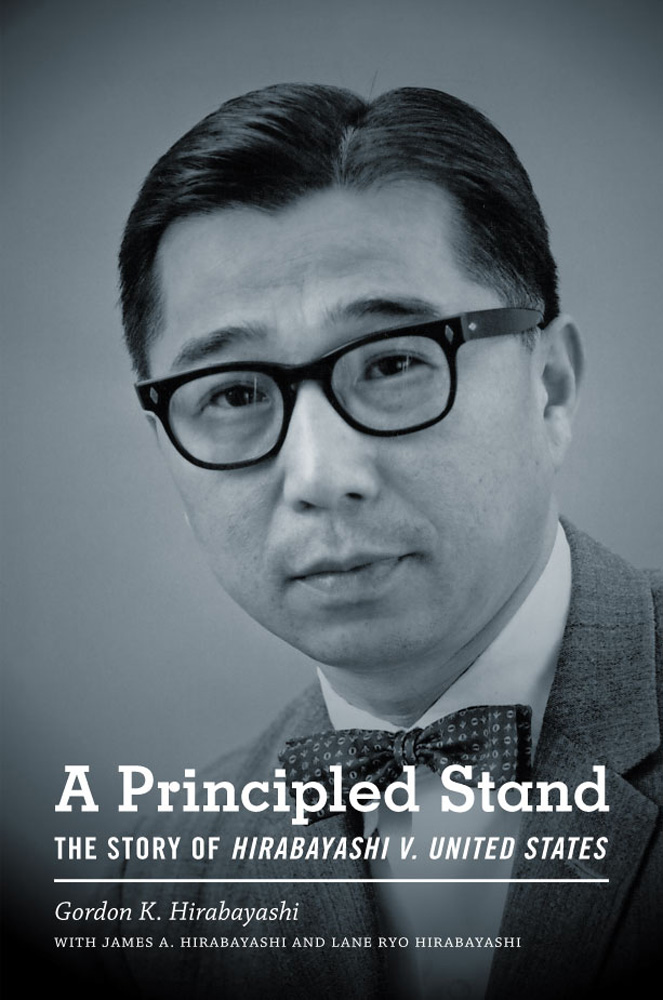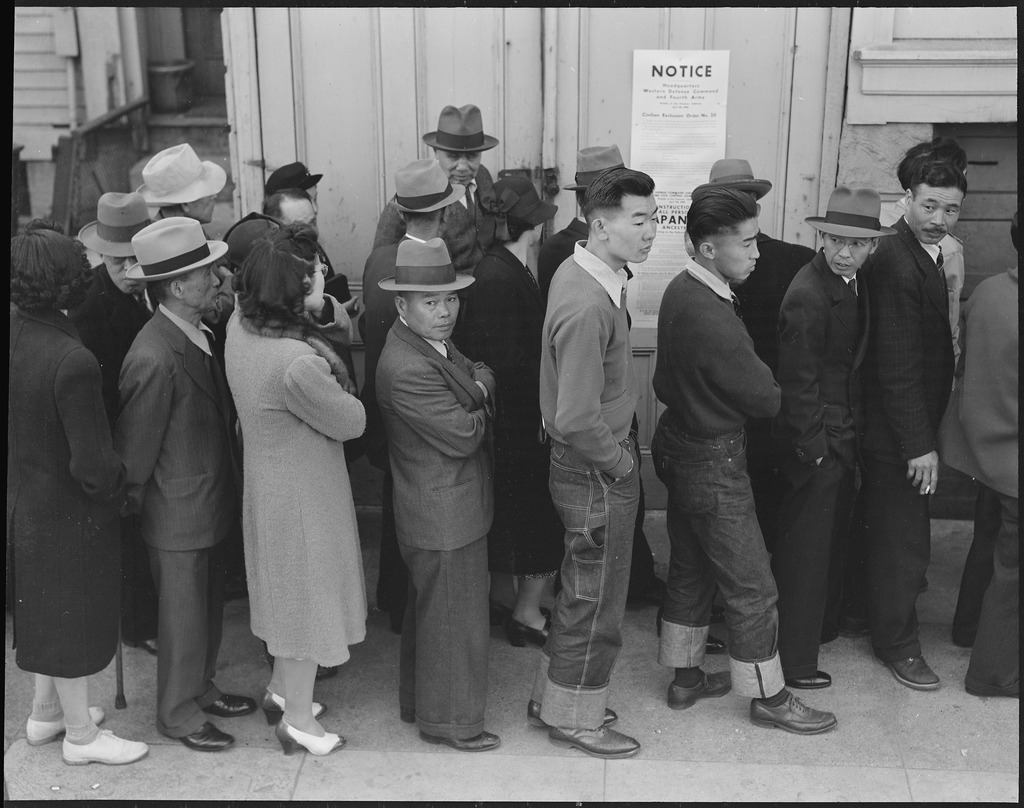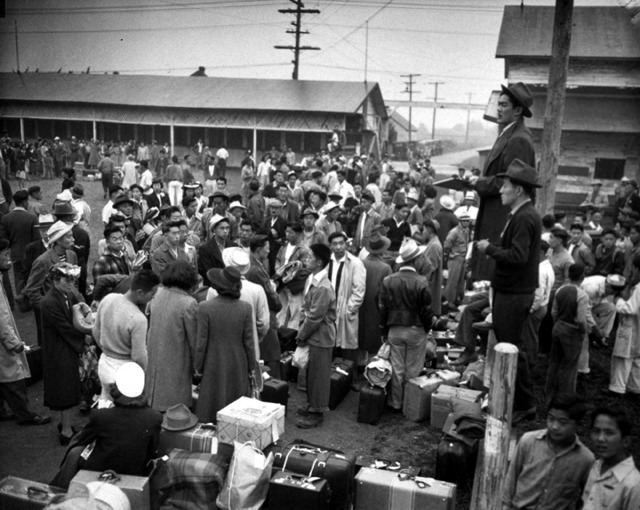April 22, 2018
Just days after his 24th birthday, Gordon challenged the government’s right to target and forcibly remove Japanese Americans without due process of law, and turned himself in to the FBI rather than going along with the forced removal. He paid a high price for his act of civil disobedience, spending the next nine months in a jail cell while awaiting trial and appealing his conviction, before being sentenced to prison when the Supreme Court ruled unanimously against him. It would take more than 40 years to correct that injustice–but Gordon never gave up, and instead continued to fight for the rights of himself and all Americans.
 In this excerpt from A Principled Stand: The Story of Hirabayashi v. United States, Gordon talks about how he arrived at the decision to disobey curfew orders and, later, exclusion orders:
In this excerpt from A Principled Stand: The Story of Hirabayashi v. United States, Gordon talks about how he arrived at the decision to disobey curfew orders and, later, exclusion orders:
Returning from New York, I became one of the leaders of the UW student conscientious objectors group right after the first peacetime conscription law [Selective Training and Service Act of 1940] was passed….As for confronting the government, with all the information I had, I thought, “They’re wrong!” For me, my position was a positive one, that of desiring to be a conscientious citizen. It was this desire that prevented my participation in the military as a way of achieving peace and democracy and other ideals for which we stood. How could you achieve nonviolence violently and succeed? War never succeeded before. War has always caused more problems than it solved. I can’t say it’s wrong for everybody, but I can’t approve of it for myself. I couldn’t put my life on the line and put my efforts toward war with how I
feel.
I wanted to work toward justice and peace in my own way. And there were others with whom I could do that, namely, liberal members of churches and political parties. We had a lot of protection actually. If we had to go to prison, treatment was all right, since the concept of conscientious objection was not ipso facto disloyal.
On Sunday, December 7, 1941, I went to the Quaker meeting as usual. After the meeting, a student came down from an apartment across the street: “I skipped the meeting this morning. Japan bombed Pearl Harbor! We’re at war!” It didn’t sound real. It was unbelievable, but it slowly sank in.
On February 19, 1942, President Franklin D. Roosevelt, acting under his emergency war powers, issued Executive Order 9066, which delegated broad powers to the secretary of war as well as U.S. military commanders to protect the national security. That protection included the right to remove any suspect individuals from military areas.
A proclamation, generally referred to as the curfew order, was issued on March 24, 1942, restricting the movement of certain individuals. General John L. DeWitt, who was the top military man in charge of the Western Defense Command, issued the curfew. It was applied to all enemy aliens—Germans, Italians, Japanese, plus non- aliens of Japanese ancestry—confining them to their residences between 8 p.m. and 6 a.m., and restricting their travel to areas within a radius of five miles from their homes. The government and military kept using this term “non-alien” in identifying the second-generation Japanese Americans, who, after all, were actually U.S. citizens by birthright. The military seemed to feel more comfortable carrying out these orders if they didn’t have to think about applying them to other Americans. At first I responded as an ordinary citizen and obeyed government orders.
As I thought the situation over, however, I reasoned that a citizen is a member of a state: a person, native or naturalized, who owes allegiance to a state and is entitled to protection from it. An alien is someone who is not a citizen. What, then, is a “non-alien”? I felt forsaken as a citizen to be included in this strange kind of categorization. It appeared that the federal government was more interested in suspending citizens’ rights than in protecting constitutional guarantees regardless of race, creed, or national origins.
At my YMCA dormitory, there were about fifteen of us, mostly locals, but some from different states and a few internationals: one or two Chinese, a Filipino, and some Canadians. They became my time- keepers. “Gordon, it’s five to eight,” and I would rush back from the library, which was about two blocks from my UW dormitory, Eagleson Hall. And then it happened. One night, I thought to myself, “I can’t do that. I have to change my philosophy or I can’t do this, or I’m not true to myself, and if I’m not, I’m not a very good citizen to anybody. Why am I dashing back and those guys are still down there, and I could stay longer and get some more work done, too?”
So I went back to the library, and the first dorm mate who saw me said, “Hey! What are you doing here?”
I said, “What are you doing here?” “Working,” he responded.
I retorted, “Well, I’ve got work to do, too, same as you. Why should I be running back if you’re not running back? We’re both Americans!” My dorm mates never turned me in. They could have. I never was arrested for curfew violation or caught as I was roaming around the University District. If I had been living a half a block away at the Japanese Students Club, I would have been one of the forty or so residents who would be returning at five to eight. If that had been the case,I wonder whether openly confronting the racist curfew order would have occurred to me?

If I were to maintain my integrity in terms of my belief that I am a first-class American citizen, but then accepted second-class status, I would have had to accept all kinds of differences. But how is it that I could raise a question about being a first-class citizen when every day I experience differences that restrict my rights because of my ancestry?
The curfew and exclusion orders were issued, making the Nisei subject to those restrictions purely on the grounds of ancestry, but many Nisei found it possible to find a way to accept those orders in the name of loyalty and patriotism. I heard various reports from the Japanese community. Nisei came to have their lunch at the YMCA, and I dropped over to the Japanese Students Club from time to time. I heard that the Issei leaders were being picked up.
Among the community, all sorts of rumors were rife, and the concentration camp fever hit us all. Others will be picked up. There was a kind of resignation among us that because the Issei were prohibited from naturalizing, they were still Japanese subjects. And with war, they were technically enemy aliens. Therefore we expected that some restrictions would fall on them, that they would all be put into some kind of confinement. I remember trying to assure the Issei that, at worst, some things like that could happen, but if they did, we Nisei would look after their needs.
Shortly after the curfew order, the government posted an official proclamation on telephone poles and post office bulletin boards: NOTICE TO ALL PERSONS OF JAPANESE ANCESTRY, BOTH ALIEN AND NON-ALIEN. Civilian Exclusion Order No. 57 commanded all Japanese and Japanese Americans out of their homes and into special, totally segregated, camps.

Soon enough, the districts of Seattle were on a deadline to move all persons of Japanese ancestry, “both alien and non-alien.” All this time I was thinking that when the last bus came, I would probably be on it. About two weeks before my time came, I said to myself, “If I am defying the curfew, how can I accept this thing? This is much worse, the same principle, but much worse in terms of uprooting and denial of our rights, and the suffering it’s going to cause.” While I had to agonize over that for a couple of days, the answer was inevitable. I found it necessary to keep myself internally intact.
I was a senior at the University of Washington. At the end of winter term in March 1942, I dropped out of the university. It was clear to me that I would not be around long enough to complete spring session. I volunteered for the fledgling local American Friends Service Committee, with Floyd Schmoe as my boss.[….]
The top priority was to sensitively respond to needs arising among the Japanese Americans. The Quakers were responding to calls for help. My assignment involved helping those families with little kids whose Issei fathers had been picked up and interned immediately after Pearl Harbor because they were leaders of the community. The mothers were busy closing the houses, arranging for storage, and preparing young children to carry their things on the trek to camp. Gosh! Something seems wrong; helping people to go behind barbed wires and into flimsy shacks. What a mixed-up life this is—the American way. It really horrified me to help these families pack up their belongings, drive them down to the temporary camp at the Western Washington Fairgrounds in Puyallup, and leave them behind barbed wire.

Japanese Americans from Seattle arrive at the Puyallup detention facility, which was also known as “Camp Harmony” (a euphemism coined by army public relations officials days before the first Nikkei arrival and a name in common usage by camp survivors). Courtesy of the Museum of History and Industry.
Those who saw me waving goodbye expected to see me within a few weeks, a prisoner myself. Then, somewhere in a period of a few days, it occurred to me that if I can’t tolerate curfew, how can I go with this camp deal, which is much worse? As long as I had come to this stage, I thought I couldn’t do it. It was only about a week before the last evacuee left, but by then, I knew I wouldn’t go! [….]
My parents, who still lived in Thomas, were expecting to be uprooted sometime in May, and because we lived south of Seattle, the family was initially going to be sent to the center for Japanese Americans erected at Pinedale, California. They thought that I would be home in time to join them for the exodus. I had to explain what was happening to me and tell them that I would not be joining them. Because of travel restrictions and demands on my time by the Quaker service work, I had to telephone home to give my parents the unpleasant news.
My mother pleaded, “Please, put your principles aside on this occasion, come home, and move with us. Heaven knows what will happen to you if you confront the government. You are right and I agree with you, but this is war. We’re all facing unknowns. We are going to be moved, but we don’t know where or for how long. The worst of all would be that if we are separated now, we may never get together again.”
That was quite a concern to her if I continued to defy the government. My brother Ed heard Mom crying and begging. She had read The Count of Monte Cristo, and as that was her only reference to jails and prisons, she worried about the consequences of my decision. I might face the firing squad or something like that. I told her, “If I change my mind because of your pressure, it wouldn’t be good. I need to retain my own self-respect, because when I take this stand, I am following what I think is right. I can’t change my views, since I’d rather remain true to my beliefs and be true to you as your son.”
After the war, my brother Ed observed, “Once they had done all they could do to dissuade Gordon and saw they couldn’t change his mind, they became his greatest supporters and were proud of him, in spite of the terrifying thought of his being in prison.”
In a 1999 interview with Densho, Gordon reflected on his mother’s support, and his decision to take a stand:
—
Excerpt from A Principled Stand: The Story of Hirabayashi v. United States
By Gordon K. Hirabayashi
With James A. Hirabayashi and Lane Ryo Hirabayashi
Courtesy of the University of Washington Press
